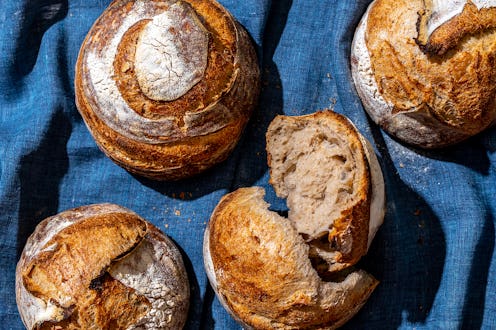Life
Sorry To Burst Your Starter’s Bubbles, But Sourdough Isn’t Always Healthier Than White Bread

Bread is, to put it scientifically, delicious. However, the debate over which breads are bad for you health-wise may have just gotten a little more complicated. One 2017 study on whether white bread or sourdough bread is healthier shows that there’s no major distinction in the health properties between either. In other words, maybe we can all be free to bread as we please.
As reported by The Atlantic, sourdough bread has been thought in recent years to be a healthier alternative to white bread. Some studies have suggested that the microbes which give sourdough its tangy, distinctive taste also reap health benefits, like producing acids which prevent spikes in insulin. Sourdough’s “digestibility,” again thanks to those microbes, is also touted as a reason it’s the better bread.
However, the study published in the journal Cell Metabolism, lead by Israeli scientists Eran Segal and Eran Elinav, suggests there’s no significant difference between the effects white bread and sourdough bread have on the body. What’s even more interesting is that while some people’s blood sugar levels spiked more significantly after eating white bread than sourdough, others' did the opposite. Meaning, determining which bread to be healthier could vary from person to person. Segal tells The Atlantic he has two explanations for his results: “One possibility is that the two breads induce exactly the same effect. The more intriguing possibility is that each bread induces different effects in different people.”
The study was conducted on a group of 20 people who had the honor and privilege of eating different kinds of bread in the name of science. Half the group spent a week eating white bread and then another week eating sourdough. The other half did the opposite, first eating sourdough for a week and then the white bread. Researchers measured different variables in the participants before and after each week of bread eating, checking things like weight, blood sugar, and cholesterol. In both groups, the kind of bread they ate did not appear to have any significant effect on any of the factors they measured.
Before you start cultivating your sourdough starter, know that Susan Roberts, a professor of nutrition at Tufts University, finds the results dubious. Roberts told The Atlantic, “Of course you wouldn’t expect to see significant effects in one week, with a small amount of bread, in 20 people. That doesn’t mean there isn’t an effect. It just means this study was underpowered.” On a related note, if any scientists are looking to do another follow up study that involves eating lots of bread for days on end, hit me up please and thanks.
That said, sourdough bread may have health benefits that white bread simply can't offer. "The fermentation process [in sourdough bread] reduces the gluten content and enhances the bioavailability of nutrients in the flour," gastroenterologist Dr. Will Bulsiewicz M.D. previously told Bustle.
Given the impressive amount of bread we eat each year — one study found that 50% of Americans eat a sandwich a day — it makes sense that we’d want to go with best possible option. There’s still a significant amount of data that suggests whole grains are good for you. Multiple studies have associated eating more whole grains, like whole-grain bread, can lead to lower risk of heart disease, cancer, and Type 2 diabetes. A study conducted in 2016 by the Harvard School of Public Health found eating at least three servings of whole grains every day to be linked to lower risk of death from stroke and heart disease. Since you *can* make sourdough with any kind of flour — white, wheat, rye, oh my! — you can double up on nutritional goodness with a whole-grain natural levain, if you like.
But when it specifically comes to standard sourdough versus white bread, perhaps you can just go with your gut. Unless you’re making a grilled cheese. Then, you best be blessed with some sourdough bread.
Expert:
Dr. Will Bulsiewicz, M.D., gastroenterologist
Studies cited:
Saa, D. T., Silvestro, R. D., Dinelli, G., & Gianotti, A. (2017). Effect of sourdough fermentation and baking process severity on dietary fibre and phenolic compounds of immature wheat flour bread. LWT - Food Science and Technology, 83, 26–32. doi: 10.1016/j.lwt.2017.04.071
Zong, G., Gao, A., Hu, F. B., & Sun, Q. (2016). Whole Grain Intake and Mortality From All Causes, Cardiovascular Disease, and Cancer. Circulation, 133(24), 2370–2380. doi: 10.1161/circulationaha.115.021101
“Sandwiches are a major contributor of sodium in the diets of American adults: Results from What We Eat in America, NHANES 2009-2010,” by Rhonda Sebastian, MA; Cecilia Wilkinson Enns, MS, RD; Joseph D Goldman, MA; M. Katherine Hoy, EdD, RD; Alanna J Moshfegh, MS, RD, Journal of the Academy of Nutrition and Dietetics, DOI: 10.1016/j.jand.2014.07.034
This article was originally published on